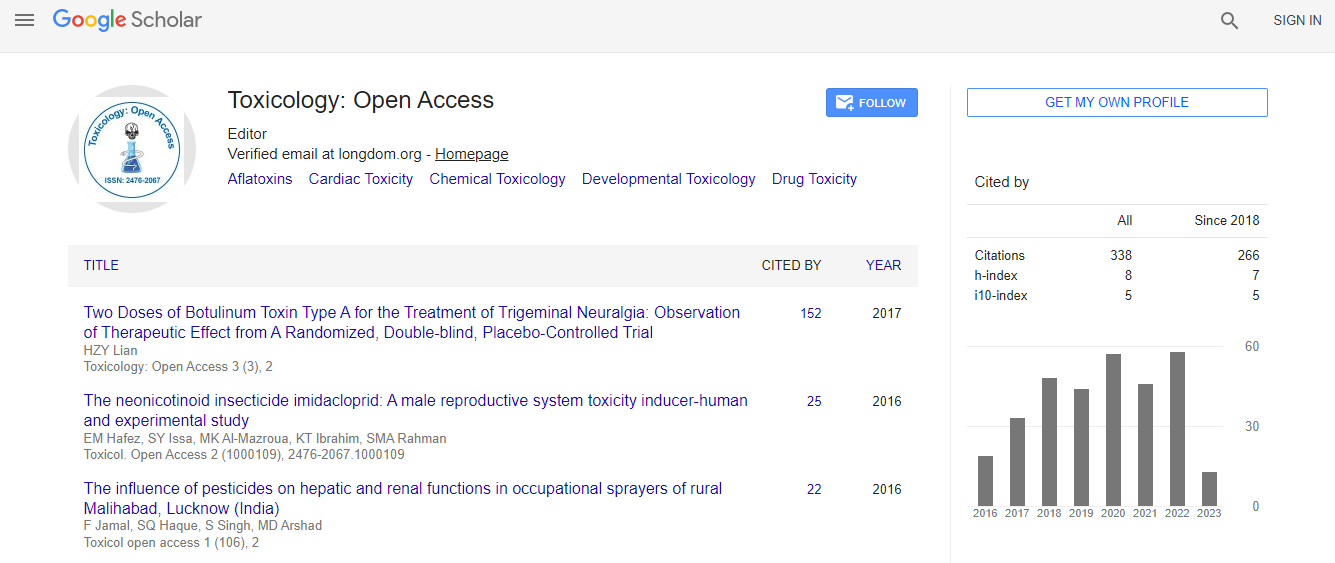Research Article
Alteration of Cytokine Profiles Inhibits Efficacy of Silver Nanoparticle-based Neutralization of Arenaviruses
Nathan Elrod1, Jeff Brady2,3, Harold Rathburn1 and Janice L. Speshock1*1Tarleton State University, Department of Biological Sciences, Stephenville, TX 76402, USA
2Tarleton State University, Department of Wildlife, Sustainability, and Ecosystem Sciences, Stephenville, TX 76402, USA
3Texas A&M AgriLife Research and Extension Center, Stephenville, TX 76401, USA
- *Corresponding Author:
- Janice L. Speshock
Tarleton State University, Department of Biological Sciences
1333. Washington Street, Box T-0100, Stephenville, TX 76402, USA
Tel: (254) 968-9341
E-mail: speshock@tarleton.edu
Received date: March 27, 2016; Accepted date: April 14, 2017; Published date: April 19, 2017
Citation: Elrod N, Brady J, Rathburn H, Speshock JL (2017) Alteration of Cytokine Profiles Inhibits Efficacy of Silver Nanoparticle-based Neutralization of arenaviruses. Toxicol Open Access 3:124. doi: 10.4172/2476-2067.1000124
Copyright: © 2017 Elrod N, et al. This is an open-access article distributed under the terms of the Creative Commons Attribution License, which permits unrestricted use, distribution, and reproduction in any medium, provided the original author and source are credited.
Abstract
Background: Arenaviruses are important pathogens that can cause hemorrhagic fever or meningoencephalitis. There is not an effective treatment targeting arenaviruses, which necessitates a search for therapies against this virus family, as well as others. Silver nanoparticles (Ag-NPs) have been shown to have effective antiviral activity in cell culture models against arenaviruses, and therefore it was hypothesized that they may make an effective therapeutic against viral meningitis. However, the silver nanoparticles interfered with normal cytokine profiles produced in response to the virus infection, which led to exacerbated pathology.
Methods: Mice were infected with Tacaribe virus, a mouse-adapted arenavirus that causes lethal encephalitis. The virus was left untreated or treated with 10 nm Ag-NPs, which were demonstrated previously to inhibit virus replication in cell culture. Virus replication, brain pathology, and cytokine profiles (pro-inflammatory interleukins and type I interferons), as well as over morbidity and mortality were assessed in the mice with and without treatment.
Results: Although the viral loads appeared to be reduced in the Ag-NP treated mice, mortality was observed in all virus-infected animals, regardless of whether or not they received nanoparticle therapy. The Ag-NP treatments also the innate immune response against the virus infection and unregulated the production of interleukin-1 beta, which likely contributed to the observed mortality in the mice.
Conclusions: This study confirms why it is important to assess promising in vitro results using in vivo models. Biological barriers can impact the efficacy of therapeutics in mammals. Although Ag-NPs may still have success as an antiviral therapeutic in other areas of the body that are less constricted, in sensitive areas such as the brain, the nanoparticles can cause very adverse reactions.

 Spanish
Spanish  Chinese
Chinese  Russian
Russian  German
German  French
French  Japanese
Japanese  Portuguese
Portuguese  Hindi
Hindi 